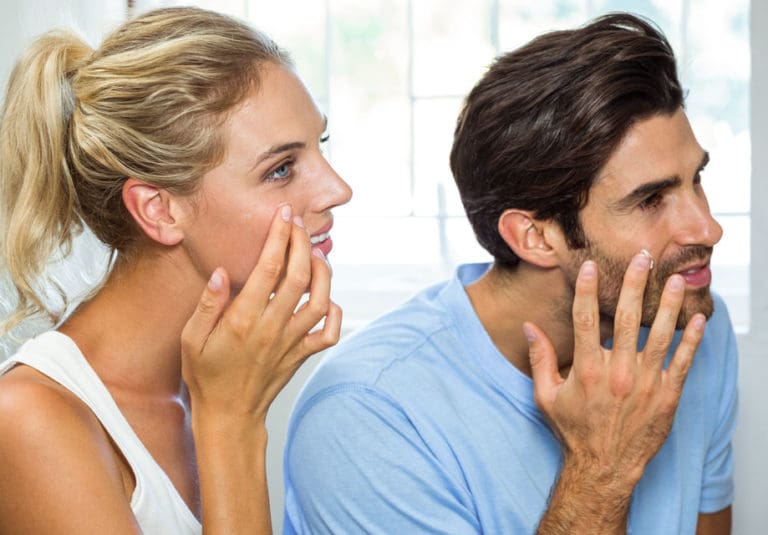
It’s very common for both men and women to be unhappy with their complexion. In general this refers to its appearance which often goes hand-in-hand with how it feels.
Many people would love to take their skin back to the time when it was smooth, dewy-looking, glowing and fresh – their youth. However, as we get older the skin’s structure will naturally change. This is accompanied by exposure to a variety of other factors from our lifestyles and the environment which together will affect its texture and tone.
Here are Face Medical’s top 5 skin concerns:
Lines and wrinkles
These are a common result of ageing skin and everyone will experience this concern to some degree. Collagen and elastin will become lost as their production will naturally slow down and levels will decline. And, as our faces and bodies are in use everyday, the skin and muscles move repeatedly. It’s the combination of these two processes together that lead to weak, thin skin that creases. However, skin ageing and the development of lines and wrinkles will occur gradually over time. Most people won’t become concerned until they reach their 30’s or 40’s, but lines and wrinkles will become more pronounced with time.
Although this concern will happen naturally, there are factors involved that can accelerate the process, leading to early development and / or deeper set wrinkles. Smoking, alcohol, UV rays, poor diet, lack of hydration and air pollution can speed up the rate at which collagen and elastin breakdown and should be considered when looking to maintain youthful skin.
Hyperpigmentation
Patches of skin that are darker than the skin’s usual tone are known as hyperpigmentation. Many people consider this as a normal part of skin ageing, but this is often because it most commonly develops later in life. Small, round areas of darker brown skin are the result of pigmented cells; when they are affected by an overproduction of melanin (the substance that gives the skin its colour). This occurs as UV rays penetrate the skin, and its response is to create a protective barrier – another job for melanin. Over time, the excess melanin will clump together and it becomes visible on the surface. In some cases it can be a sign that the inner cells are damaged. Another example of hyperpigmentation is melasma which usually develops on the face. As well as UV rays, this condition is linked to hormonal changes causing melanin to be produced.
Hyperpigmentation itself is not usually found to be harmful, although it is usually permanent. This is because the pigmented cells are deep with the skin and rarely make it to the surface to be expelled. Face Medical stresses the importance of using SPF everyday which is essential when looking to avoid age spots. SPF provides the protective barrier the skin needs to prevent UV rays from infiltrating to the deeper layers.
Acne
This concern is not always experienced by teenagers, as it’s a common concern among adults too. Fluctuating hormones are the most likely cause and are responsible for the increase in oil (sebum) on the skin’s surface. It’s excess oil, mixed with bacteria and dead skin cells becoming lodged in the pores that leads to acne. Spots can range from small blackheads and pus-filled pimples, to larger cysts or nodules which can damage the skin and tissues when they burst. As it’s hormone related it stands to reason that people are more likely to experience acne when going through puberty, pregnancy, menopause and general ageing.
Some people are more prone to developing acne than others. Preventing breakouts of spots often requires regular cleansing and exfoliation, using targeted skincare products that help to regulate the production of sebum.
Rosacea
Around 1 in 20 adults in the UK are affected by rosacea. It’s found that women are more likely to be affected, usually when they reach middle-age, and if they have fair skin. Common symptoms include: facial redness, impromptu flushing, pus-filled spots and sensitivity. Rosacea mainly affects the cheeks and chin, and over time, the inflammation can lead to the development of thread veins. Exposing the skin to one or more triggers is thought to be the cause of this concern, including: hot beverages, alcohol, sun exposure, spicy foods, hot temperatures and stress / anxiety.
Rosacea is a long-term concern, and as yet, there is no known cure. The best way to manage the condition is to avoid triggers. Targeted skincare can help to calm inflammation and maintain the strength of the skin.
Dull skin
Dull skin commonly appears alongside dry skin. Maintaining a radiant complexion requires adequate cleansing and exfoliation so the pores are clear and dead skin cells have been removed from the surface. It’s the build up of old skin cells that prevents the skin from glowing, and dry skin can often hinder the natural exfoliation process. Sun exposure, smoking, alcohol, a poor diet and not drinking enough water can contribute to the development of dry, dull skin.
Face Medical’s skincare experts can recommend a suitable skincare regime to ensure the complexion remains fresh and vibrant. This can include a daily routine of cleansing, toning, moisturising, applying skin supplements and twice-weekly exfoliation to keep the skin nourished, hydrated and in tip-top condition.
If you’re affected by any of these common skin concerns (or others we haven’t mentioned) an in-clinic treatment can enhance the results of your regular skincare routine.
